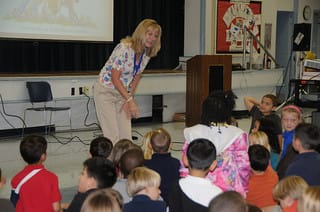I don’t love standards. I doubt any teacher does.
I love literature. History. Science. I love grappling with ideas. I’m excited to know how things work and to share what I have learned with others, especially eager-to-learn children. Standards, by contrast, are unlovely, unlovable things. No teacher has ever summoned his or her class wide-eyed to the rug with the promise that “today is the day we will learn to listen and read to analyze and evaluate experiences, ideas, information, and issues from a variety of perspectives."
 No teacher has ever summoned his or her class to the rug with the promise that "today is the day we will learn to listen and read to analyze and evaluate experiences, ideas, information, and issues from a variety of perspectives. Won't that be fun boys and girls?!" Photo by Fort Rucker. |
“Won’t that be fun, boys and girls?!”
Well, no, it won’t. Standards are a joyless way to reverse engineer the things we love to teach and do with kids. Thus I understand and sympathize if beleaguered teachers view Common Core State Standards (CCSS) as just one more damn thing imposed on them from on high, interposed between them and their students. But if they do, that’s a shame. Because far from being just another compliance item on the accountability checklist, the Common Core State Standards, implemented well and thoughtfully, promise to both improve literacy and make teaching a lot more fun and significantly more rewarding.
In the essential primary grades, where most of our educational battles are won or lost, CCSS promise to return sanity to the work of turning children into readers, writers, speakers, and thinkers. David Coleman, the principal architect of the English language arts standards, recently said CCSS “restores elementary teachers to their rightful place as guides to the world.” He’s exactly right, and here’s why:
Content is back
“A student never thanked me for teaching the main idea,” a teacher wrote to me recently. “But many thanked me for teaching them about animal migrations.” CCSS remind us to engage children not just with rote literacy skills work and process writing, but also, and especially, with real content—rich, deep, broad knowledge about the world in which they live. The conventional wisdom has become that CCSS “add nonfiction to the curriculum,” but that’s not right. Common Core restores art, music, history, and literature to the curriculum.
Why did they ever leave? Reading is “domain specific.” You already have to know at least a little bit about the subject—and sometimes a lot about the subject—to understand a text. The same thing is also true about creativity, critical thinking, and problem solving. Indeed, nearly all of our most cherished and ambitious goals for schooling are knowledge-dependent. Yet how many times have we heard it said that we need to de-emphasize teaching “mere facts” and focus on skills like critical thinking, creativity, and problem-solving? CCSS rescue knowledge from those who would trivialize it, or who simply don’t understand its fundamental role in human cognition.
Coherence matters
Common Core asks not just for more nonfiction, but for a coherent, knowledge-rich curriculum in English language arts. Yes, there’s a difference. Perhaps the gravest disservice done to schoolchildren in recent memory is the misguided attempt to teach and test reading comprehension not just as a skill, but as a transferable skill—a set of tips and “reading strategies” that can be applied to virtually any text, regardless of subject matter.
 Putting history and science at the center of ELA instruction doesn't exclude literature. Photo by Amanda Munoz. |
Make no mistake: Building the foundations of early reading—teaching young children to decode written text—is indeed skill-based. The CCSS recognize this crucial truth by calling for the systematic teaching of explicit phonics skills. However, "the mistaken idea that reading [comprehension] is a skill,” University of Virginia cognitive scientist Daniel Willingham has written, “may be the single biggest factor holding back reading achievement in the country. Students will not meet standards that way. The knowledge-base problem must be solved." CCSS aim to solve it by requiring a curriculum “intentionally and coherently structured to develop rich content knowledge within and across grades.” Let’s be clear: The standards are not a curriculum and do not pretend to be. But they have plenty to say about the importance of “building knowledge systematically” and choosing texts “around topics or themes that systematically develop the knowledge base of students.”
Sandra Stotsky recently expressed her dismay “that one badly informed person [lead Common Core author David Coleman] could single-handedly alter and weaken the entire public school curriculum in this country.” But how do you weaken something that does not exist? But at least at the K-5 level there is no curriculum. The fruitless focus on teaching reading as a content-neutral skill—find the main idea, identify the author’s purpose, compare and contrast—created conditions where what kids read doesn’t matter; in that regime, “text” becomes a vehicle for practicing non-existent comprehension “skills.” Big mistake. Putting history and science at the center of ELA instruction doesn’t exclude literature. It repudiates the imperialism of trivial fiction that has debased ELA and deprived students of the knowledge they need to understand serious fiction—and just about everything else.
By asking teachers to focus their efforts on building knowledge coherently—and making it clear that doing so is fundamental to literacy—CCSS represent an essential breakthrough for reading comprehension and vocabulary growth. The intellectual DNA of Common Core ELA Standards belongs to E.D. Hirsch, Jr., whose fundamental proposition has long held that a knowledge-rich classroom is a language-rich classroom.
CCSS invite elementary-school teachers to rethink the tedious regimen of content-free “mini-lessons” and empty skills practice on whatever reading materials happen to be at hand. "There is no such thing as doing the nuts and bolts of reading in Kindergarten through fifth grade without coherently developing knowledge in science, and history, and the arts. Period,” Coleman said recently at an event run by Common Core (the non-profit organization). “It is the deep foundation in rich knowledge and vocabulary depth that allows you to access more complex text," he said.
Show what you know
Perhaps the most controversial new thrust of CCSS is their “reliance on text and evidence-based reading” for fiction as well as non-fiction. Too many people have tried to characterize this as diminishing the importance of fiction and literature. That is not the case—and close reading of text is necessary for both. The very worst that can be said about a reliance on text- and evidence-based reading and writing is that it’s an overdue market correction.
As any teacher can tell you, it’s quite easy to glom on to an inconsequential moment in a text and produce reams of empty “text-to-self” meandering using the text as nothing more than a jumping off point for a personal narrative. (“How do you feel about the character’s decision to hit her friend?”) The skill, common to most existing state standards, of “producing a personal response to literature” does little to demonstrate—or to build—a student’s ability to read with clarity, depth, and comprehension. I understand the criticism of those who find the focus on texts and evidence as too narrow, but I don’t agree. Indeed, it has always struck me as inherently condescending to assume that children cannot be engaged or successful unless they are reflecting upon personal experience nearly to the exclusion of other subjects.
In sum, Common Core strikes me as, at long last, the re-emergence of common sense in our classrooms. We’re no longer ignoring what we know about reading comprehension and language development. And we’re making elementary-school teachers the most important people in America. I still don’t love standards. I never will. But the big ideas enshrined within CCSS were long overdue to be restored, renewed, or otherwise placed at the heart of ELA instruction from the first days of class in every American school.
Even Common Core opponents should be pleased.
Robert Pondiscio is the vice-president of the Core Knowledge Foundation and a former fifth-grade teacher.
Updated 6/15/12
